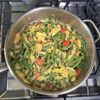Sometimes referred to as “Baby Lagos,” Houston is known for its booming West African population, with reportedly one of the largest Nigerian populations in the country. Still, even with a solid community and dozens of Nigerian restaurants, the cuisine is not as mainstream in Houston as it could be.
Times are changing, though. Several local chefs and restaurateurs are getting creative and crafty with how they package and present Nigerian and West African cuisines with the hopes of making them more accessible, more popular, and more understood by diners who are unfamiliar with them. Houston residents like Ope Amoso, Kavachi Ukegbu, and Tobi Smith (all of whom were most recently featured on the second season of Hulu’s Taste of the Nation) are making a mark in the food industry with innovative approaches to Nigerian and West African cuisines. They hope to make West African culture and its staple dishes like fufu and soup and jollof rice household names. Here’s how they’re doing it:
This Rice University business school graduate started dreaming up his Houston restaurant after seeing that the demand and curiosity for West African cuisines in the States were going largely unfulfilled, he says. “You can’t just go out your door and get it as conveniently as you can get a pizza, burger, tacos, or ramen,” says Amosu, who is Nigerian. “Yes, you have African restaurants, but they’re often not as easy to access and clustered to one side of town.” More than that though, many West African dishes are a labor of love that take hours to prepare and are often made in large batches meant to feed lots of people.
Enter ChòpnBlọk. Founded originally as a pop-up in 2018, Amosu opened the restaurant’s permanent location in Post Houston in November 2021 in hopes of building an empire that could one day make West African cuisine as plentiful and accessible as the salads from the fast-casual chain Sweetgreen. With every bowl of curry chickpeas, jollof jambalaya, and Stewd plantains, he hoped to tell a story of the African diaspora, one that went beyond just his Nigerian heritage. The restaurant, which has a prominent location at the front of Post Houston, has since seen success. Amosu says he is proud that ChòpnBlọk is often the first restaurant for diners who have never experienced West African cuisine.
:no_upscale()/cdn.vox-cdn.com/uploads/chorus_asset/file/24963149/IMG_0736.jpg)
Amosu aims to take the experience further this year, kicking off Nigerian Independence Day celebrations with the inaugural Chopd & Stewd festival, a full day’s worth of cultural immersion and education, with scheduled speakers, vibrant Afro-beats yoga sessions and dance-offs, wellness programming, dining in the on-site culinary village, and more. He has plans to open a flagship standalone ChòpnBlọk restaurant in Houston in early 2024.
This longtime chef and creative has made it her mission to bring Nigerian dishes like fufu, made of a pounded starch like yam, and its various styles of soups and stews to the masses. Born into cooking, Ukegbu’s mother — a Nigerian native and a Texas Southern University graduate — opened Safari, the first Nigerian restaurant in Houston in the early 1980s, a time when Ukegbu says many people in the community still weren’t receptive to Nigerian culture and cuisine. She remembers her mother cooking spice and seasoning-laden foods in her home that would often leave a smell on her clothes that her fellow students found off-putting; her elementary school teachers stowing away her mother’s rice and stew dish on International Day because they weren’t sure what it was.
“To me, it was normal,” she says, but to others, it was unfamiliar. “We were living two lives,” Ukegbu says. “There was our American life, and then we were living the Nigerian life in our own world.”
:no_upscale()/cdn.vox-cdn.com/uploads/chorus_asset/file/24963024/image4__1_.jpeg)
But in college, Ukegbu decided to merge the two. In 2010, while a full-time senior at the University of Houston’s Hilton College, Ukegbu opened her first restaurant, Peppersoup Cafe, across the parking lot from Safari, focusing on pepper soup, a spicy seasoned Nigerian soup often made with meat and lemongrass. After closing the restaurant in 2011 to do some soul-searching, her vision for the Art of Fufu and amplifying West African foods began.
Ukegbu, who later launched Gribido, a consulting company that promotes and rebrands international food products within the American market, began hosting Art of Fufu events, an immersive experience that uses art as a vehicle to celebrate and introduce Nigerian dishes to the world.
She hosted her first art show in 2017, and three years later, released the cookbook of the same name, the first of its kind to focus on fufu, rice, and stew, a staple among West African countries, along with swallows, a food typically eaten by swallowing without chewing.
“Fufu, that is us. It’s a part of our DNA. That is our culture on a plate,” Ukegbu says. “Now, our normal is focusing on creating this experience for people to start making fufu,” Ukegbu says. For some people, the Art of Fufu is their first introduction. “We want to make them comfortable and confident to make the soup,” Ukegbu says. “It’s with the goal of just preserving our food culture and bringing more knowledge to the table.”
:no_upscale()/cdn.vox-cdn.com/uploads/chorus_asset/file/24963025/image2__7_.jpeg)
Today, though, Ukegbu says West African food — Nigerian cuisine, in particular — has come a long way, with more people accepting and showing curiosity. In 2021, fufu and Nigerian soups trended on social media, specifically TikTok, with thousands of people trying out the food on the camera. Ukegbu says that many people have become fascinated with Nigerian cuisine after learning about their Nigerian heritage through DNA and ancestry test services. The 2023 Taste of the Nation Hulu special featuring Ukegbu and other location Nigerian restaurateurs and chefs was a pivotal moment that brought her to tears.
“It’s helping change the narrative of a lot of Nigerians. They are letting people know there’s a whole community here,” Ukegbu says.
Tobi Smith and Bethany Oyefeso, Adùn
Lagos native Tobi Smith was pursuing his master’s degree in hospitality and management at the University of North Texas when he became homesick. He was craving Nigerian food, but with few choices in the area, he was left with one option — to experiment. After sharing his experience on social media and receiving requests for his recipes, Smith launched his blog “All I Could Do Is Cook,” where he quickly learned that many Nigerian immigrants and residents were in the same tough spot he was in. In many places, commonly used Nigerian ingredients were hard to find. Quality Nigerian restaurants were rare, and packing or shipping food from back home proved challenging; many readers said they had their food confiscated from their carry-on bags when flying home.
:no_upscale()/cdn.vox-cdn.com/uploads/chorus_asset/file/24963028/Adu_n_Product_Packaging_stack.jpg)
:no_upscale()/cdn.vox-cdn.com/uploads/chorus_asset/file/24963031/The_Orisirisi_Box___Adu_n.jpg)
Adùn
Smith continued to immerse himself in the world of cooking and began researching packaging. In 2018, he ditched his plans to pursue a doctorate and decided instead to pursue his culinary dream, moving to Houston to team up with his business partner Bethany Oyesfoso, who had a catering business. Together, the two formed what is now called Adùn. The company, named after a Nigerian Yoruba word that means flavor, ships ready-to-heat-and-eat African dishes like soups, stews, pastries, and meat pies to 48 states, not including Alaska and Hawaii. Some of the allure of Adùn is that it transforms dishes that are typically time-consuming to prepare into something quicker to cook and enjoy. The meals are intended to be smaller, manageable portions and come in appealing recyclable packaging that educates the consumer on what they’re eating, Smith says.
“We’re building a holistic education around Nigerian food. We’re not just excited when it’s viral. We’re excited that you know what it is and that you know where this soup is from,” Smith says.
:no_upscale()/cdn.vox-cdn.com/uploads/chorus_asset/file/24963039/Adu_n_Owambe_Table_with_Jollof_Rice__Native_Rice__Ayamase.jpg)
Today, the company sells more than a dozen products, including its bestselling beef pies; ofada stew; a Uroba soup from Western Nigeria, and its popular Rodo Crisps — chili crisps made out of scotch bonnet peppers that are preserved in oil and salt and sold at Phoenicia Specialty Foods. Its largest customer base is from the D.C., Maryland, and Virginia areas and Seattle, and now the company is cooking up a line of dishes and ingredients that can be purchased in grocery stores around the country.
Eventually, Smith says he wants Adun to expand its reach to Canada, the United Kingdom, and eventually Nigeria, bringing the company to its spiritual home. But Houston, he says, will always be the heart of the operation. “We want people to see themselves in places they go every day,” Smith says.
Source link








